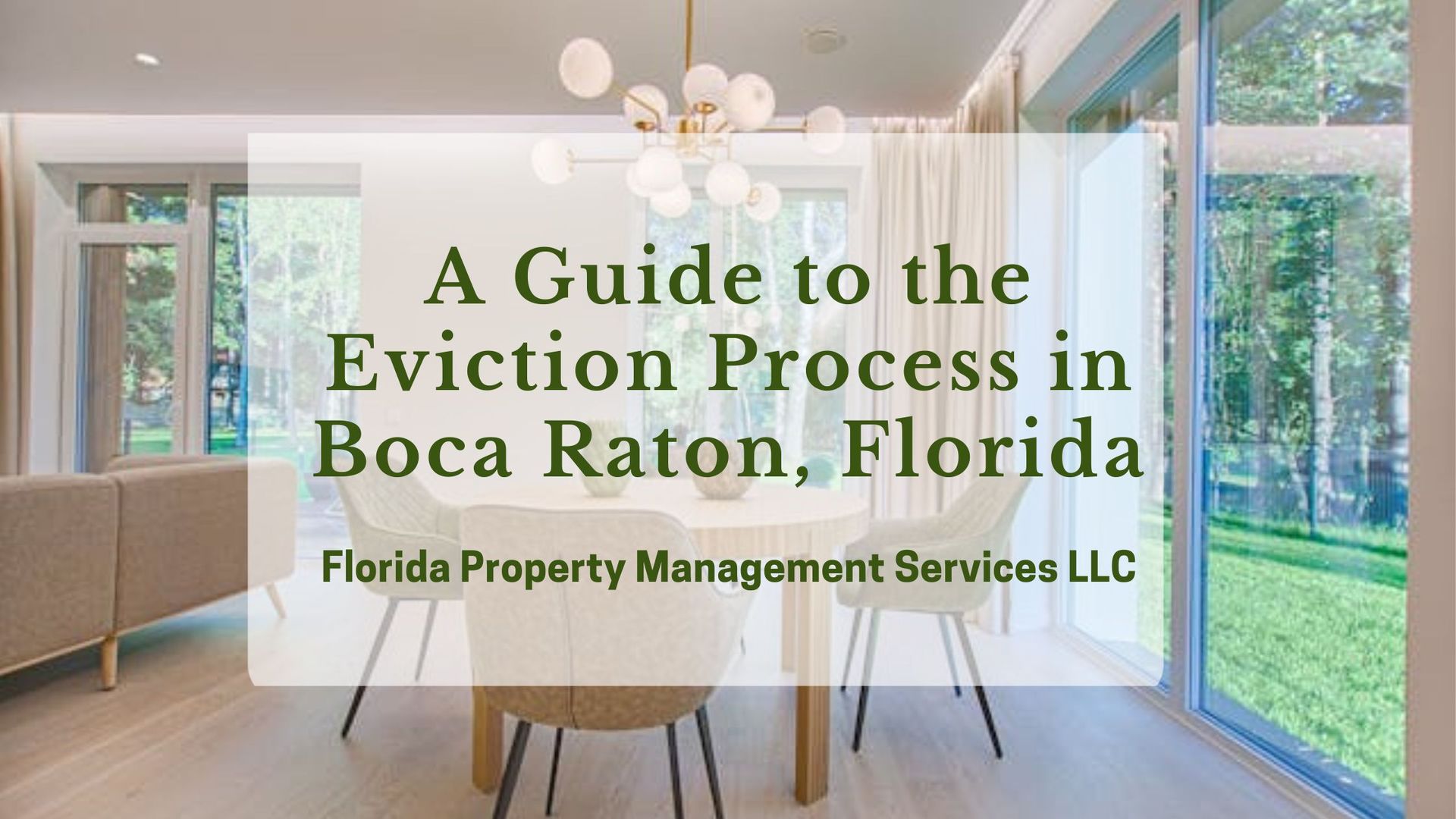A Guide to the Eviction Process in Boca Raton, Florida

In Florida, the eviction process is governed by a specific set of laws that landlords must meticulously follow to legally remove a tenant from their property. Understanding these regulations is crucial to ensure you act in accordance with the law and avoid potential legal disputes.
The process typically spans two to three weeks in theory but in reality due to courts backlogs it can take 4 to 6 weeks from beginning to completion and depending on the County where the property is located. However, this duration can vary based on the grounds for eviction. If tenants choose to contest the eviction complaint, landlords might anticipate a longer process.
The focus of this guide is to offer knowledge and clarity to landlords who may find themselves entangled in the Florida eviction process.
Notice for Lease Termination with Legal Cause
In Boca Raton, Florida, landlords cannot evict tenants without a valid reason. Reasons for eviction include late or missed rent payments, overstaying at the property after a lease expires, breaking lease terms or landlord-tenant laws, and committing any illegal activity.
Here's how it works:
● Late Rent: Rent becomes overdue the day after its due date, unless the lease says otherwise. Landlords must give tenants a 3-day notice to pay or vacate. If the rent isn't paid within these three days, the eviction process can begin.
● Expired Lease: Tenants who stay without a lease or after their lease ends can be evicted. Landlords must give a 15-day notice to vacate. If tenants haven’t left by then, landlords can proceed with eviction.
● Lease Violations: For violations of lease terms or landlord-tenant laws, landlords must give a 7-day notice before starting an eviction. Some violations can be fixed, like unauthorized pets or poor cleanliness. If the same issue recurs within a year, landlords may not offer a second chance to correct it.
● Illegal Activity: Tenants involved in illegal activities on the property can also be evicted. The process usually requires landlords to provide evidence of illegal activity and serve a notice as specified by Florida law before proceeding with eviction.
Serving a Tenant with an Eviction Notice in Florida
The Florida eviction process starts when landlords give their tenants written notice. This notice can be handed directly to the tenants, mailed via regular, certified or registered mail, or placed prominently on the front door.
The length of the notice required depends on the eviction reason and how often the tenant pays rent:
● 3-day notice: For unpaid rent. This period excludes weekends and holidays. 5 days if the address for the tenant to deliver payment is outside of the County where the property is located.
● 7-day notice: For lease violations or breaches of landlord-tenant laws, give tenants a week to remedy the issue or leave. As well as repeated lease violations or substantial property damage.
● 30-day notice: For tenants without a lease or those staying beyond the end of a month-to-month lease.

Tenant Eviction Defenses in Florida
If the tenant feels they were wrongfully evicted, they may choose to pursue this matter in court. A tenant may claim that:
● The landlord attempted to illegally evict them by removing their belongings, changing the locks, or cutting off utilities without following
the proper legal process.
● The tenant corrected a minor lease violation.
● The eviction is based on discriminatory reasons against the tenant.
● The eviction is retaliatory, possibly in response to the tenant exercising legal rights.
● There was no actual breach of the lease terms.
● The landlord neglected to maintain or repair the property adequately.
● There are significant errors in the eviction notice or complaint, such as not including the effective date of eviction.
Attending the Court Hearing
Tenants in Florida should send their response within five business days. If the tenant does not contest the eviction, the landlord can file for a default judgment to secure a Judgment for Possession.
Conversely, if the tenant does contest the eviction, the court clerk may demand that the tenant pay all overdue rent and any rent accruing until the lawsuit concludes. Landlords must also appear in court. Should the tenant fail to attend the hearing, the court will typically rule in the landlord’s favor automatically.

To get ready for the hearing, both the landlord and tenant should bring the following items:
● A copy of the lease agreement.
● The notice to quit or to pay rent and proof of delivery or posting
● The filed complaint.
● Any supporting evidence (such as photos of damage or billing statements) or witnesses that could help strengthen their case in court.
Writ of Possession
In Florida, a Writ of Possession is a court order delivered to a tenant by a sheriff, giving the tenant a final 24-hour notice to vacate the property. This order is issued after a court has ruled in favor of the landlord in an eviction case.
The Eviction
The final step is the actual eviction when the sheriff returns to the property to finalize the eviction process.
Any belongings left behind by the tenant will remain in place and may be subject to a lien, allowing the landlord to claim them for damages that exceed the security deposit or unpaid rent.
Bottom Line
The eviction process in Florida is a detailed legal procedure designed to protect the rights of both landlords and tenants. Landlords need to carefully follow each step—from delivering the proper notices to obtaining a court judgment—to legally regain possession of their property. It’s equally crucial for tenants to understand these steps to protect their rights and know how to respond if they are facing eviction.

Evictions can be a complex part of managing a property, but following the legal rules ensures fairness and maintains order in the landlord-tenant relationship. Both landlords and tenants are advised to seek legal counsel to effectively navigate this process and comply with Florida's specific laws and regulations.
As a landlord, it’s recommended to work with a professional property management company that is well-versed in the Florida landlord-tenant law. Having an experienced property manager handle complicated tasks such as an eviction can greatly help make the process smoother, reducing unnecessary stress to the part of the landlord. For questions, contact Florida Property Management Services LLC and we’ll be happy to assist you.
Disclaimer: Please note that the information provided in this blog is intended for general guidance and should not be considered as a replacement for professional legal advice. It is important to be aware that laws pertaining to property management may change, rendering this information outdated by the time you read it.














